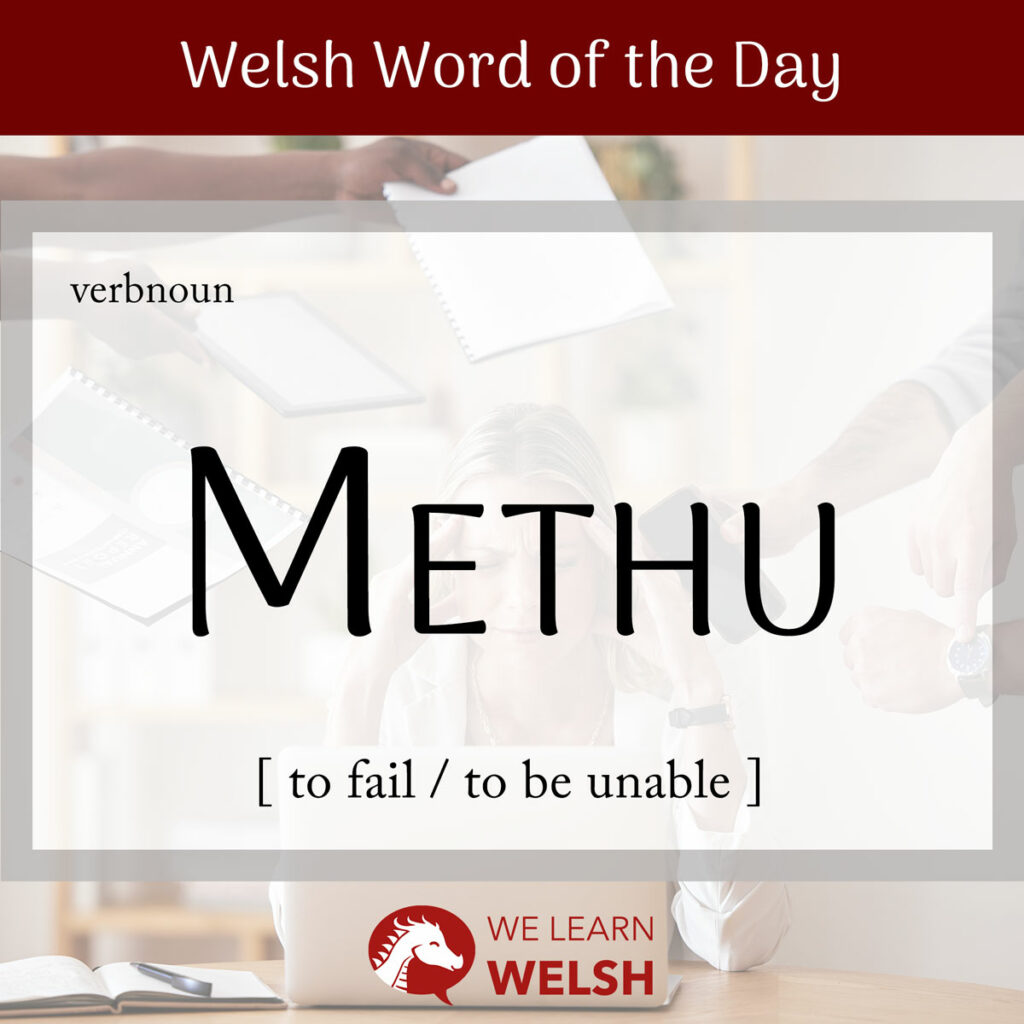No matter how talented someone may be, we all have our weaknesses and moments when things don’t go as planned. A particularly useful Welsh word to describe these situations is methu, which means to fail or to be unable.
methu
to fail / to be unable
Sometimes Southerners pronounce it a bit more like this:
Methu actually comes from a noun, meth (failure / deficiency), although the latter is the less used of the two words these days. Meth does turn up in its mutated form in the phrase yn ddi-feth (without fail), though.
Methu is a cognate of the Old Irish methaid, and both words likely come from a proto-Celtic root that would be something along the lines of *metom.
Rather than meth, today methiant is used to mean failure or error. Of course, this in turn is derived from methu. It can also be used as an abstract noun to mean cowardice, and its plural is methiannau or methiantau. One quite harsh Welsh turn of phrase is mynd yn fethiant (literally: go to failure) which means to go bankrupt!
I’ve briefly mentioned mutations. Methu, meth and methiant are all susceptible only to the soft mutation. For methu, this looks and sounds like:
Soft mutation
fethu
Nasal mutation
N/A
Aspirate mutation
N/A
Now let’s take a look at methu’s two meanings.
Firstly, methu means to be unable to. It’s perhaps best translated as cannot / can’t. The opposite of this is gallu or medru (to be able to / can). To give you a sense of how this works, here are some ways in which it might be used.
- Dw i’n methu nofio = I can’t swim
- Mae hi’n methu canu = She can’t sing
- Roeddet ti’n methu ei ddarllen = You couldn’t read it
- Bydd e’n methu deall = He won’t be able to understand
- Roedden ni’n methu ei gredu = We couldn’t believe it
- Basech chi’n methu ymdopi = You wouldn’t be able to cope
As you can see, the above examples vary in person and tense. What’s important is that methu comes before the verb that the subject is unable to do, just like cannot / can’t comes before the verb in English.
Maen nhw’n methu coginio’n dda.
They can’t cook well.
Secondly, methu means to fail. Again, this is a pretty simple equivalence which reflects how the word is used in English. You might methu prawf (fail a test), methu arholiad (fail an exam), or methu archwiliad (fail an inspection). In the South, colloquially, ffaelu is sometimes used instead.
In a related sense, methu can also be used to mean to become weak or to decay, usually for a living organism or organ. For example, methiant y galon is heart failure.
For this usage, diffygio and pallu are synonyms. If you are more specifically saying to weaken, you would say gwanhau instead. And some specific circumstances have their own words – for example my eyesight is failing is mae fy ngolwg yn tywyllu (my eyesight is darkening) or mae fy ngolwg yn pylu (my eyesight is dulling).
To succeed in Welsh is llwyddo, and to pass (as in passing a test) is pasio, although llwyddo is often used where pass would be in English, and is more formal.
Gobeithio na fydda i’n methu fy TGAU.
I hope I won’t fail my GCSEs.
In Welsh, conjugations of verbs are often periphrastic. This means that the main verb of its sentence is left in its root form, and auxiliary verbs are used to convey the tense and subject. So, it’s more important to learn the conjugations of some of the most basic verbs in Welsh, like bod (to be) and gwneud (to do / to make), than it is to learn the conjugations of every new verb you encounter.
However, in case you’re interested, here are the most commonly used conjugations of methu:
| Future | Conditional | Past | |
| First person singular | Metha(f) i I will fail / I will not be able to | Methwn i / methswn i I would fail / I would not be able to | Methais i I failed / I couldn’t |
| First person plural | Methwn ni We will fail / we will not be able to | Methen ni We will fail / we will not be able to | Methon ni We failed / we couldn’t |
| Second person singular / informal | Methi di You will fail / you will not be able to | Methet ti You would fail / you would not be able to | Methaist ti You failed / you couldn’t |
| Second person plural / formal | Methwch chi You will fail / you will not be able to | Methech chi You would fail / you would not be able to | Methoch chi You failed / you couldn’t |
| Third person singular | Methith o/e/hi He/she will fail / he/she will not be able to | Methai fo/fe/hi / Methsai fo/fe/hi He/she would write / he/she would not be able to | Methodd o/e/hi He/she failed / he/she couldn’t |
| Third person plural | Methan nhw They will fail / they will not be able to | Methen nhw They would fail / they would not be able to | Methon nhw They failed / they couldn’t |

In English the idiom can’t see the wood for the trees is often used to mean that someone is focussing on small details and missing the bigger picture. This would be translated in Welsh as methu gweld y coed gan brennau, but it’s only common in the North of Wales.
A more widely used expression is dw i’n methu byw yn fy nghroen (I can’t live in my skin) which is used to express extreme excitement or anxiety.
We all have things we can’t do – but the good news is that now using methu isn’t one of these for you!

